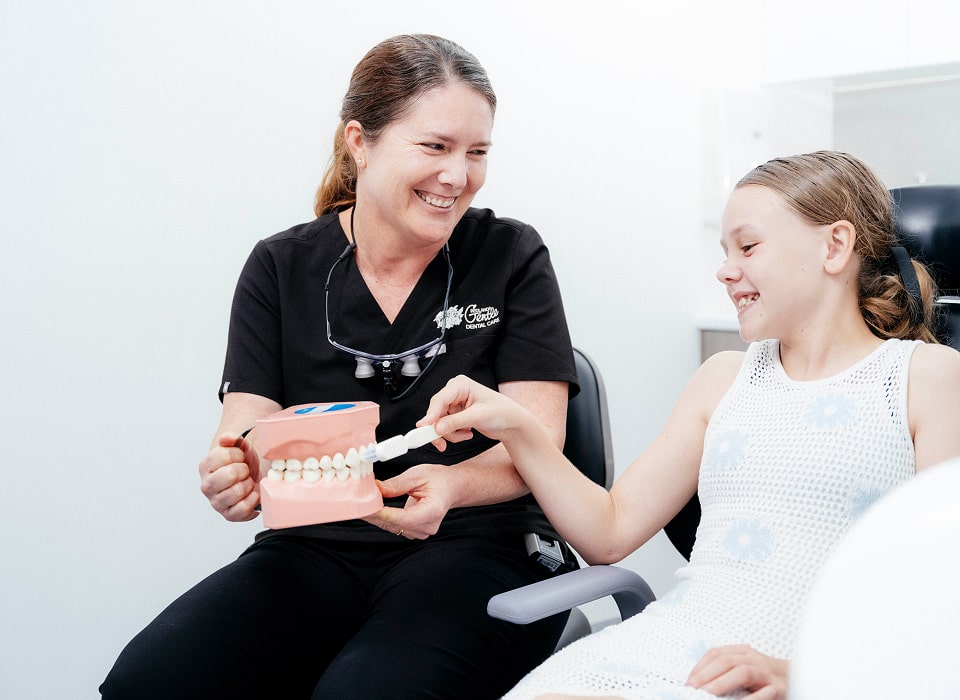Restore Your Smile with Natural-Looking Dental Implants in Capalaba
Dental implants in Capalaba help replace missing teeth with strong, natural-looking restorations. We support your comfort and care, welcoming patients from Capalaba and the surrounding Redlands suburbs for treatment.
Why Choose Redlands Gentle Dental Care
Capalaba’s Go-To Team for Safe, Reliable Dental Implants
When it comes to restoring your smile, feeling comfortable and confident in your care matters. At Redlands Gentle Dental Care in Capalaba, we take the time to understand your needs. Our team provides reliable, personalised dental implant treatment you can trust.

Experienced and Skilled Dental Implant Team

Advanced Implant Technology

Transparent, Flexible Payment Options

Local Care with a Personal Touch
The Dentists
Meet Your Dental Implant Dentists at Redlands Gentle Dental Care

BDSc. (Hons) (QLD) MClin Dent (Implant Dentistry) | Capalaba
Dr. Chris Waters
- Dr. Chris Waters is a skilled dental professional with over 16 years of experience in implant procedures and patient care.
- He completed a Master of Clinical Dentistry in Dental Implants, focusing on advanced techniques and treatment planning.
- Dr. Waters holds a Bachelor of Dental Science Honours from the University of Queensland (2002) and an MClinDent from Griffith University (2013).

B.Dent. Hons (Syd) | Victoria Point
Dr. Colin Phan
- Dr. Colin Phan is a skilled dentist with significant experience in providing dental implant treatments for patients.
- He has completed extensive training in dental implants, focusing on restoring teeth with reliable and durable results.
- Dr. Phan graduated with a Bachelor of Dentistry from the University of Sydney in 2014, laying a solid foundation in dentistry.
Two Convenient Locations
Quality Dental Services Made Accessible for Families in the Victoria Point Area
Capalaba Dental Clinic
- (07) 3245 5511
- 149 Old Cleveland Rd Capalaba, QLD, 4157
- Free Parking Available
Victoria Point Dental Clinic
- (07) 3820 7777
- 2/1 Bunker Road, Victoria Point, QLD, 4165
- Free Parking Available

Dental Implants: Functional Tooth Replacement with Natural-Looking Results
Missing teeth can affect your ability to chew, speak clearly, or feel confident about your smile. Over time, gaps may also lead to bone loss in the jaw and unwanted changes to your bite or facial structure.
These changes can impact both comfort and long-term oral health. While dentures and bridges are common tooth replacement options, they may not suit everyone. Some patients want a more stable and natural-feeling restoration to replace missing teeth without altering surrounding teeth.
Dental implants are titanium posts placed in the jaw to support a crown, bridge, or denture. They help restore strength and appearance by integrating with the bone. With proper care, they can last many years. Our Capalaba team uses advanced digital imaging and treatment planning for comfort, precision, and predictable results tailored to each patient’s needs.
Explore the Functional and Aesthetic Benefits of Implants
Dental implants offer more than just cosmetic improvements. They help restore your bite and preserve your oral health. Because they feel more like natural teeth, many patients choose them for long-term tooth replacement.
- Dental implants restore your ability to chew properly, allowing you to enjoy a varied diet without discomfort or worry about slipping dentures.
- They help prevent jawbone loss by stimulating the bone, which supports long-term facial structure and reduces the risk of a sunken appearance.
- Because implants are securely anchored in the jaw, they remain stable during daily activities, such as eating and speaking, and do not require adhesives.
- Each implant is designed to resemble your natural teeth in shape and feel, enhancing both your smile’s appearance and your ability to speak clearly.

Patient Reviews
Read Patient Testimonials About Their Experience with Our Gentle Dental Care
Megan M
Courtney
Megan Dickie
Sam Arthy
Janette P
Megan M
Courtney
Megan Dickie
Sam Arthy
Janette P
Stephen Travers
Jan Zielinski
Tom McEwan
Sonja Stevens
Moea Barber
Stephen Travers
Jan Zielinski
Tom McEwan
Sonja Stevens
Moea Barber
Before and After Gallery
Explore real examples of how dental implants can restore the appearance and function of a healthy smile. These clinical images show treatment outcomes achieved through evidence-based planning, surgical precision, and patient care. Individual results vary depending on oral health and bone structure. Treatment is always personalised and discussed in detail during your consultation with our experienced dental team.
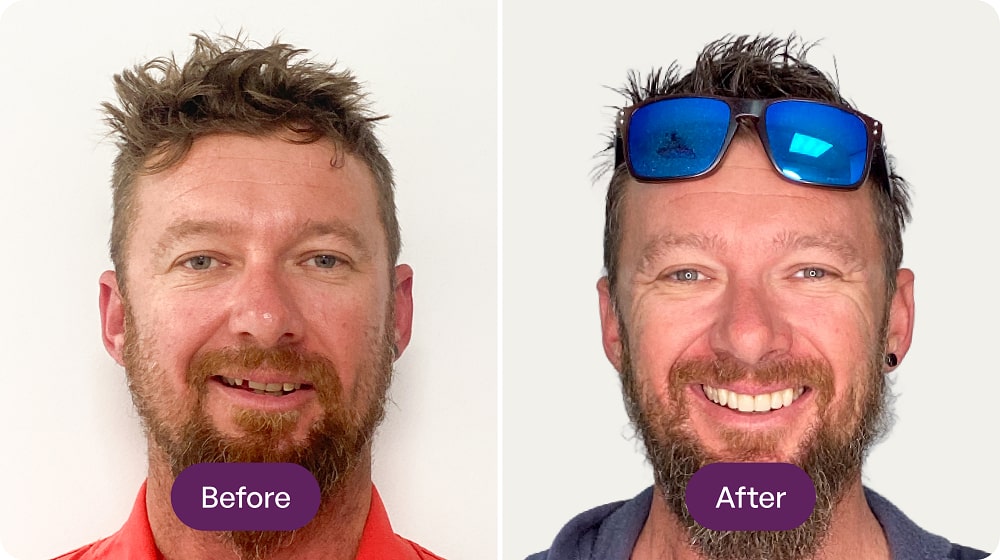
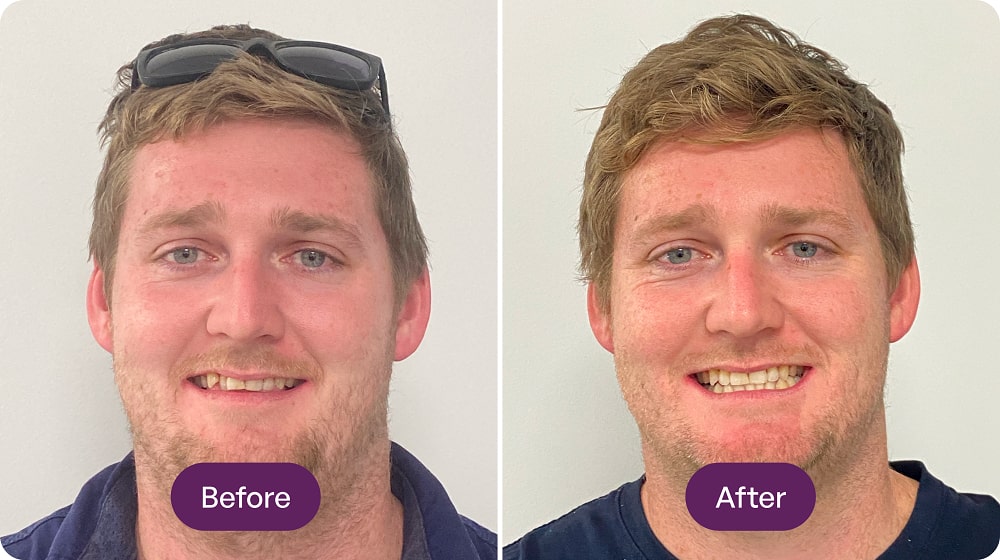
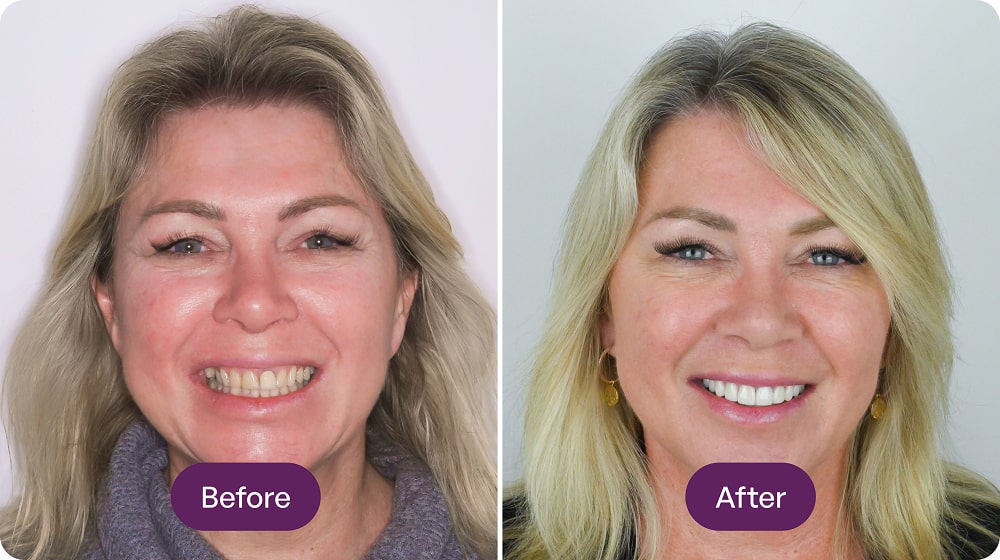
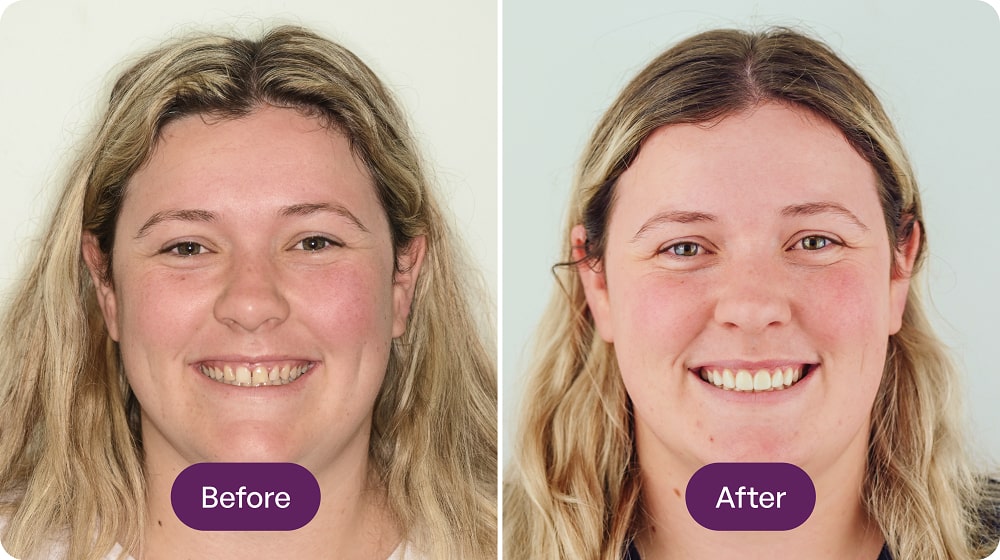

Take the First Step Toward a Confident Smile Today with Dental Implants
Comprehensive Comparison of Dental Implants and Alternative Treatments
| Feature | Dental Implants | Dental Bridges | Traditional Dentures |
|---|---|---|---|
| Longevity | 5-15 years with proper care | Over 10 years, may require replacement over time | 5-8 years, may need adjustments or replacement |
| Jawbone Preservation | Stimulates and preserves jawbone | Does not stimulate jawbone, may lead to bone loss | Does not stimulate jawbone, can cause bone loss |
| Comfort | Comfortable, feels like natural teeth | Comfortable, but can cause irritation or sensitivity | May cause discomfort and require adhesives |
| Cost | Higher initial cost | Lower cost than implants but can add up over time | Most affordable option initially, but requires upkeep or replacement later on |
| Maintenance Requirements | Low maintenance, requires regular brushing and check-ups | Requires cleaning and may need replacement | Regular cleaning, relining, and adjustments needed |
| Aesthetic Result | Natural-looking and blends well with surrounding teeth | Can look natural, but may not blend as seamlessly | Can look natural, but may appear bulky or artificial |
What to Expect
Learn What Happens at Your Dental Implant Consultation Appointment in Capalaba





Medical History Review

Oral Health Assessment

Digital Imaging and Scans

Treatment Plan Discussion

Cost & Timeline Overview

The Implant Process
What You Can Expect During Treatment and Recovery with Dental Implants







Initial Consultation

Implant Site Preparation

Surgical Implant Placement

Healing and Integration

Abutment Attachment Stage

Final Crown Placement

Aftercare and Monitoring

Dental Implant Cost
Explore Our Transparent Pricing of Dental Implants to Guide Your Treatment Decisions
Single Tooth Implants
A missing tooth can affect your appearance, bite, and speech. A single-tooth dental implant replaces it, preventing bone loss and restoring function.
- The cost covers the surgical placement of the implant, including the titanium post and the fee for the dental professional who will perform the procedure.
- It includes the abutment and custom-made crown designed to restore the tooth's function and appearance.
- Pre-treatment evaluations, such as consultations and imaging, are also included for accurate planning and assessment.
Multiple Implants
Replacing multiple missing teeth with implants prevents oral health complications, including bone deterioration. This option eliminates the need for traditional bridges or partial dentures.
- The cost is determined based on the number of implants required and the case's complexity, as each treatment is unique.
- Costs typically include the implant components, such as the posts, abutments, custom-made crowns or bridges, and the surgical procedure.
- Additional costs may apply for bone grafting or sinus lift procedures, if required and follow-up visits.
Implant-Retained Dentures
For those missing most or all teeth, implant-retained dentures are a trusted choice. By anchoring the denture to implants, this offers long-term comfort and durability.
- The cost includes the placement of implants that will hold the dentures securely.
- It covers the attachment components, such as abutments, that connect the implants to the dentures to keep them in place during daily activities.
- Custom dentures are included to replace missing teeth and work specifically with the implant system for effective functionality.
Implant-Supported Dentures
Implant-supported dentures provide a durable and comfortable alternative to traditional dentures, offering enhanced stability and functionality. They eliminate the need for adhesives and reduce dietary restrictions.
- This treatment involves surgically placing dental implants into the jawbone and establishing a secure foundation for the dentures.
- It covers the creation of custom dentures designed to fit securely over the implants, improving comfort and functionality.
- The fee may not include preparatory procedures, such as bone grafting, which facilitate stable bone support in case of insufficient bone density.
Our Payment Plans
Find What Works for Your Financial Needs With Our Dental Payment Plans
Child Dental Benefits Schedule
Invest in your child's smile with the Child Dental Benefits Schedule (CDBS). This government program offers eligible families financial support for essential dental services, promoting good oral health habits from an early age.
The CDBS covers up to $1,095 over two years for basic dental care like check-ups, cleanings, and fillings for children aged zero to 17. Eligibility depends on Medicare status and specific government payments, making quality dental care more accessible to families.
Learn MoreDental Services for DVA Card Holders
Veterans deserve high-quality dental care, and the Department of Veterans' Affairs (DVA) program delivers just that. The program offers dental benefits that vary based on card type.
Gold Card holders receive comprehensive cover for clinically necessary treatments, from routine check-ups to advanced procedures. White Card holders are covered for dental care related to accepted service-related conditions or mental health needs. Our clinic proudly supports veterans by providing high-quality dental care to maintain their overall health.
Learn MoreHumm
Simplify your dental care payments with Humm, a flexible financing option that lets you smile now and pay later. This interest-free payment plan allows you to spread the cost of your dental treatments over time, making essential care more accessible.
Humm is available for various dental services, from routine check-ups to more complex procedures. With instant approval and the ability to manage your account online, Humm helps you prioritise your oral health without financial stress.
Learn MoreZip
We offer Zip to help patients manage treatment costs. With credit limits between $1,000 and $50,000, eligible patients can select flexible repayment terms from three to 60 months, making it easier to manage costs.
Zip is ideal for anyone needing dental care without upfront costs. The user-friendly app allows you to track payments easily, so you can stay on budget while prioritising your oral health.
Learn MoreSuperCare
With the help of SuperCare, eligible patients can release their superannuation funds early to access essential dental procedures. This option is suitable for families lacking sufficient health funds or available resources, covering services such as orthodontics, implants, and root canal therapies.
SuperCare's consultants guide you through the straightforward application process, simplifying what can often be complex. This service enables you to prioritise your family's oral health without the burden of upfront costs.
Learn MoreAfterPay
Experience the convenience of dental care with Afterpay, allowing you to receive treatments now and pay later in four easy instalments over six weeks. This payment option is available to anyone over 18, a practical choice for adults looking to enhance and maintain oral health.
With no interest charges when payments are made on time, Afterpay promotes responsible budgeting. Payments are automatically deducted from your linked debit or credit card for a smooth experience.
Learn MoreBupa Preferred Provider
Enjoy exclusive benefits and hassle-free claims when you choose our clinic, a Bupa Preferred Provider, for your dental health needs. Our patients can access a comprehensive range of services, including check-ups and major procedures, often at reduced out-of-pocket costs.
Members First Ultimate also offers 100% back on two dental check-ups and cleans every six months, making regular oral care more affordable. Our partnership with Bupa allows you to receive quality care while maximising your benefits.
Learn MoreHCF Preferred Provider
Experience affordable, high-quality dental care at Redlands Gentle Dental Care. As an HCF preferred provider, patients with eligible dental cover can access reduced out-of-pocket costs, no-gap services for selected treatments, and streamlined claims processing.
HCF members can take advantage of these benefits by choosing our clinic for their dental needs. Check your policy to understand covered treatments and annual limits, and let us help you achieve a healthier, brighter smile.
Learn Morenib Preferred Provider
Access professional dental care at our clinic, a trusted part of nib's First Choice network. As a nib Preferred Provider, we offer members the opportunity to receive quality dental care at agreed rates. This provides a transparent and straightforward experience for your dental needs.
Nib members benefit from reduced out-of-pocket costs and simplified claims processes at our clinic. To make the most of your cover, review your policy for applicable limits and service inclusions.
Learn MoreYour Dental Implant Questions Answered
Frequently Asked Questions
How common is tooth loss among Brisbane residents?
Tooth loss is relatively common in Queensland. According to Queensland Health, 1 in 10 adults has fewer than the number of teeth needed for functional chewing. This impacts diet, speech, and overall well-being.
While decay is the most common cause, gum disease and trauma also contribute. Adults with fewer than 10 teeth may experience nutritional challenges or avoid certain foods, especially without stable tooth replacement options.
What is the appropriate age for getting dental implants?
Dental implants are generally suitable for adults once jaw growth is complete, usually around age 18 or older. There’s no upper age limit, as long as you’re in good health and have adequate bone to support the implant.
Patients exploring tooth replacement in Capalaba often consider implants a reliable long-term option, especially when other methods are less stable.
How do dental implants replace damaged or missing teeth?
Dental implants replace missing or damaged teeth by anchoring a titanium post into the jawbone, acting like an artificial tooth root. A custom crown is then secured on top, restoring function and appearance.
Are dental implants as good as natural teeth?
While no replacement fully replicates a natural tooth, dental implants come close in both function and appearance. They are securely anchored in the jaw, allowing you to chew, speak, and smile with confidence. Many patients describe them as the most natural-feeling option available for replacing missing teeth.
How many teeth can be replaced with dental implants?
Dental implants can replace a single tooth, several teeth, or a full arch, depending on your needs. For multiple missing teeth, a few strategically placed implants can support a bridge or denture. Your dentist will recommend an option based on your oral health, bone structure, and long-term function goals.
What is the success rate of dental implants?
Dental implants are known for their high success rate, usually 90–95% over 10 years. But like any treatment, several factors can affect how well they work.
Here’s a simple breakdown:
- Bone Quality:
Denser bone offers stronger, more reliable support for dental implants. While softer bone can still accommodate an implant, it may require additional planning, reinforcement, or extended healing time to promote stability. - Implant Size:
Longer and wider implants tend to be more stable. Smaller implants can be effective, but they may carry a slightly higher risk if placed in weaker bone. - Implant Location:
Back teeth—particularly in the lower jaw—are responsible for most of the chewing and absorb greater pressure. As a result, implants in this area may be subject to increased functional strain compared to those placed in the front. - Health and Lifestyle:
Smoking, diabetes, and poor healing can increase the risk of complications. Staying healthy and maintaining good habits can support better outcomes. - Surgical Skill:
Precise placement is essential for long-term implant success. An experienced dentist will position the implant accurately to optimise stability, function, and durability over time. - Oral Hygiene:
Daily brushing, flossing, and regular check-ups are essential. Poor oral care can lead to infection and shorten the lifespan of your implant.
Dental implants can last many years, but their success depends on your overall health, oral care, and the thoroughness of the treatment planning and execution.
What materials are commonly used for dental implants?
Most dental implants are made from titanium or zirconia, both of which are safe, durable, and well-accepted by the body.
- Titanium:
This is the most commonly used material. It integrates well with bone, is lightweight and strong, and has a long history of successful use in implant dentistry. - Zirconia:
A metal-free ceramic option. It’s naturally white, which some patients prefer for aesthetic reasons. It’s also biocompatible and offers good strength.
At Redlands Gentle Dental Care, implants are selected based on your individual needs, health history, and treatment goals. Your dentist will guide you through the available options and help determine the most appropriate choice for your clinical needs.
What happens if I don't have enough jawbone for an implant?
Jawbone loss and dental implants are closely linked, as adequate bone volume and density are essential for implant stability. If there is insufficient bone in the intended area, your dentist may recommend pre-treatment procedures to improve the chances of long-term implant success.
Common management options include the following:
- Bone grafting:
This involves adding natural or synthetic bone material to areas with bone loss. It helps regenerate bone and create a stronger foundation for the implant. Healing may take several months before the implant can be placed. - Sinus lift:
For implants in the upper back jaw, this procedure gently elevates the sinus membrane to allow for bone graft placement in areas with low bone height. - Modified implant techniques:
In some cases, shorter, narrower, or angled implants may be suitable when bone height is limited. Your suitability will be carefully assessed based on clinical imaging and health status.
These procedures are commonly performed and aim to improve implant stability and longevity. Your dentist will determine the most appropriate approach based on your oral anatomy, medical history, and overall treatment goals.
How soon after an extraction can I get a dental implant?
The timing varies depending on your bone health, gum condition, and whether there’s an infection present. Your dentist may suggest one of the following approaches:
- Immediate placement (same-day or within a week):
The implant is placed right after the tooth is removed. This may help preserve bone and reduce overall treatment time, but it’s only suitable when the area is infection-free and the bone is strong enough. - Early or delayed placement (within 2 to 8 weeks):
This approach allows initial healing of the gum tissue before placing the implant. It’s often chosen if there’s a minor infection or if the area needs time to settle. - Late placement (after 3 to 6 months or more):
This gives the bone and gums time to heal completely, especially if grafting is needed. Although it takes longer, it offers a stable foundation for long-term results.
Your dentist will assess your oral health and recommend the right timing for your implant. The goal is to place it when healing conditions are ideal for long-term function and comfort.
Are getting dental implants painful?
Most patients report only mild discomfort during and after dental implant surgery. The procedure itself is done under local anaesthesia, so you won’t feel pain while it’s being performed. Afterwards, it’s common to experience some swelling, tenderness, or slight bruising for a few days, similar to what occurs after having a tooth removed.
Pain relief medication and post-operative care instructions help manage any discomfort. Most people return to normal daily activities within a day or two.
If you’re nervous about the procedure, speak with your dentist—they’ll explain what to expect and how they’ll keep you comfortable at every step.
How long does a dental implant take from start to finish?
A full dental implant treatment generally takes three to six months, but the timeline can vary depending on your individual needs.
Here’s a general overview:
- Initial Consultation and Planning:
Your dentist assesses your oral health, takes scans, and creates a treatment plan. - Implant Placement:
The titanium post is placed into your jawbone. - Healing and Integration:
Over the next 3 to 6 months, the bone fuses with the implant in a process called osseointegration. - Abutment and Crown Placement:
Once healed, a connector (abutment) and final crown are added to complete the restoration.
If you need bone grafting or other pre-treatment procedures, your timeline may be extended. Your dentist for dental implants in Capalaba will guide you through each step with clear expectations.
What is the recovery time after getting dental implants?
Most patients feel better within a few days to a week after implant surgery. However, full healing and bone integration usually take 3 to 6 months. The exact recovery time can vary depending on several factors, including the following:
- Your overall health:
People who are in good general health often heal more quickly. - Bone quality and density:
Stronger bone can support faster integration. - Smoking and lifestyle habits:
Smoking may slow healing and increase the risk of complications. - Number of implants placed:
Placing multiple implants or a full arch can slightly lengthen recovery time. - Additional procedures:
Bone grafting or sinus lifts usually require more healing time. - Oral hygiene and aftercare:
Following your dentist’s instructions helps achieve a smoother recovery.
If you’re exploring missing teeth options in Redlands, dental implants offer a stable and long-term choice. Your dentist will explain your recovery plan and what to expect at each stage.
Do dental implants become loose over time?
Dental implants are made to bond securely with the jawbone and usually remain stable for many years. However, certain factors may cause them to loosen over time:
- Poor oral hygiene can lead to gum inflammation or bone changes, which may affect how well the implant stays in place.
- Grinding or clenching your teeth may put too much pressure on the implant, potentially leading to movement or damage.
- Infection around the implant site, such as peri-implantitis, can weaken nearby bone and tissue support.
- Changes in bone structure due to age, health conditions, or gum disease may reduce the stability of the implant.
If you ever feel movement or discomfort near your implant, it’s important to have it checked. Proper care and regular dental visits help keep implants functioning comfortably.
What aftercare is needed for dental implants?
Proper aftercare is essential to help your dental implant heal and stay healthy long-term. Your dentist will guide you through steps in proper care, but in general, aftercare includes the following:
- Brush and floss daily using a gentle technique to keep the area clean and reduce the risk of infection.
- Use a soft-bristled toothbrush and low-abrasive toothpaste to avoid irritating the implant site.
- Attend regular dental check-ups and professional cleans so your dentist can monitor the implant and surrounding tissues.
- Avoid smoking, as it can slow healing and increase the risk of complications.
- Follow your dentist’s instructions on eating and activities, especially in the days immediately after surgery.
Caring for your implant like a natural tooth helps protect your investment and promotes long-term comfort and stability.
How often do I need to visit the dentist after getting implants?
Routine dental visits are important for maintaining your implant and supporting long-term oral health. Here’s what to expect:
- You will attend several follow-up appointments during the healing phase so your dentist can check how well the implant is integrating with the bone.
- After the final crown is placed, most patients return for check-ups every six months, just like with natural teeth.
- Your dentist may recommend more frequent visits if you have certain risk factors, such as gum disease, diabetes, or teeth grinding.
- Each visit allows your dentist to monitor the implant’s stability, assess the health of your gums, and evaluate how your bite is functioning.
- Professional cleaning during these visits helps reduce plaque build-up around the implant, lowering the risk of inflammation and other complications.
Keeping up with regular dental care helps protect your implant and maintain its long-term function and comfort.
What are the risks or complications of dental implants?
Dental implants have a high success rate, but like any surgical procedure, there are risks. These are generally rare and can often be managed with early intervention and proper care:
- Infection around the implant site may develop, especially if oral hygiene is poor or healing is delayed.
- Gum inflammation, also known as peri-implantitis, can affect the surrounding tissue and bone support.
- Nerve impingement may occur if the implant is placed too close to a nerve, leading to tingling or numbness in the area.
- Sinus issues can arise when implants are placed in the upper back jaw, particularly if there is not enough bone height.
- Loosening of the implant or crown may happen over time, especially with excessive bite pressure or insufficient bone support.
Your dentist will assess whether dental implants are suitable for you and explain any relevant risks. They’ll also guide you on how to minimise these risks through proper care and regular check-ups.
